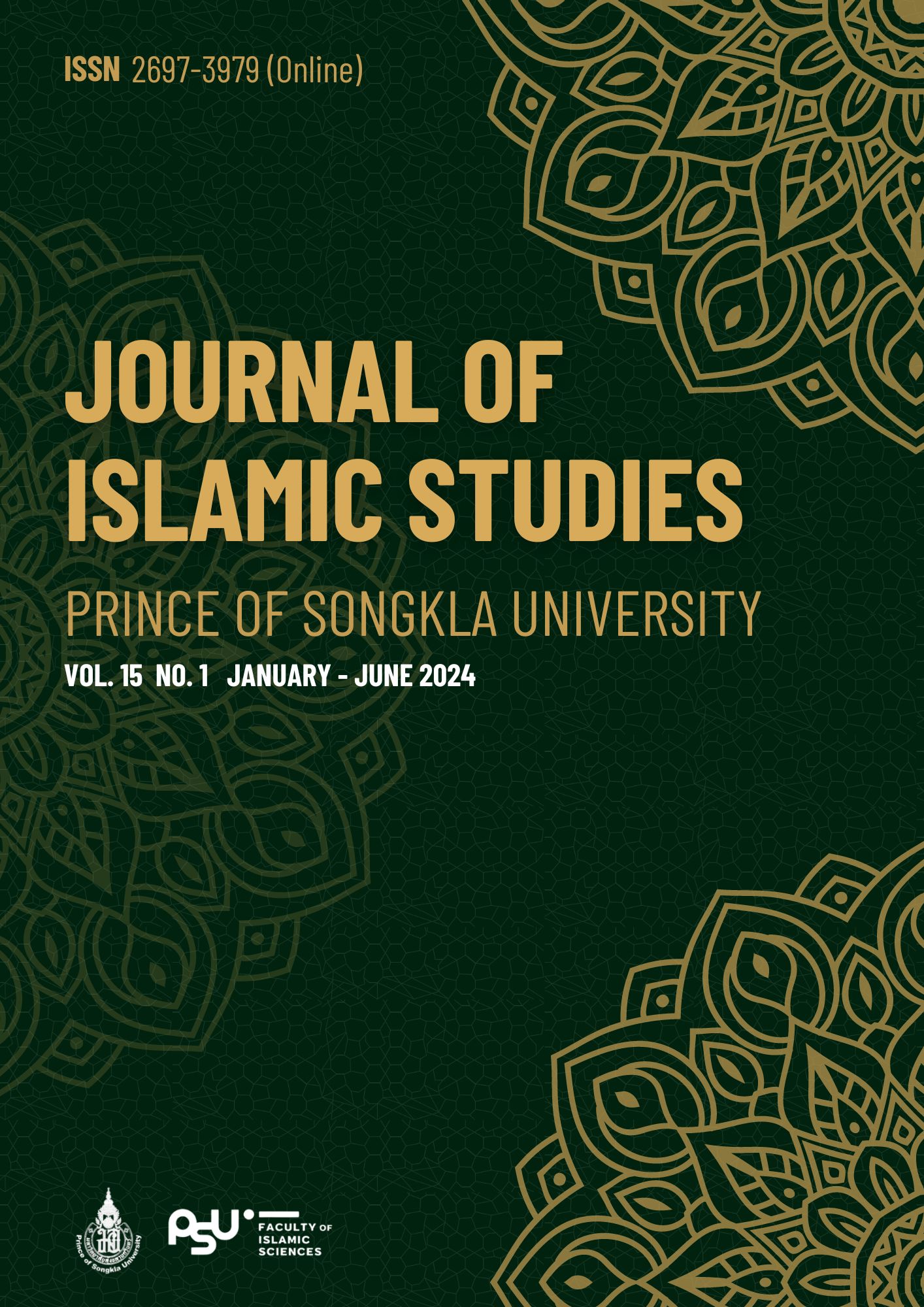The Development of Analytical Thinking Skills by QSCCS Processing on Al-Hadith Subject for Primary School Students, Year 6
DOI:
https://doi.org/10.14456/jois.2024.9Keywords:
Development, Analytical, Skill, QSCCS, Al-hadithAbstract
Objectives: 1) to determine the effectiveness of QSCCS learning plans in Al-Hadith subject for primary school students, year 6, achieving efficiency of 70/70 criteria, 2) develop analytical thinking skills using QSCCS process in Al-Hadith subject for primary school students, year 6 using 70 percent criteria, 3) compare the learning outcomes of students before and after implementing QSCCS learning plans in Al-Hadith subject for primary school students, year 6, and 4) study the satisfaction of primary school students, year 6 towards QSCCS learning plans in Al-Hadith subject.
Methodology: The target population used in this research included 25 primary school students, year 6 at Ban Batu Mittraphap School 66, Paluka Samo Subdistrict, Bacho District, Narathiwat Province, in the second semester of the academic year 2023 obtained by purposive sampling technique. The research instruments consisted of 1) five QSCCS learning plans in Al-Ha6, subject for primary school students, year 6, 2) 30 items of analytical thinking skills assessment using QSCCS process in Al-Hadith subject for primary school students, year 6, 3) two sets of academic performance test in Al-Hadith subject for primary school students, year 6 before and after QSCCS learning, and 4) satisfaction survey of primary school students, year 6 on QSCCS learning plans in Al-Hadith subject. Statistics used to assess the quality of the instrument included content validity, difficulty, discrimination, reliability, and E1/E2 ratio while statistical analysis was mean, standard deviation, and t-test.
Research findings: 1) The QSCCS learning plans in Al-Hadith subject for primary school students were highly effective, exceeding the set criteria of 70/70, with an efficiency of 80.83/82.50. 2) The development of analytical thinking skills using the QSCCS process in Al-Hadith subject for primary school students surpassed the 70 percent criteria at 83.60 percent. 3) A comparative result of an average score after implementing the QSCCS learning plans in Al-Hadith subject for primary school students, year 6 was significantly higher than before at 24.80 > 17.40, with a statistically significant difference at 0.05 level. 4) Overall, primary school students, in year 6 expressed high satisfaction with the QSCCS learning plans in the Al-Hadith subject (x̅ = 4.34, S.D. = 0.26).
Contribution: This research can be used for academic purposes in terms of developing a model for teaching and learning Islamic studies.
References
Batu School. (2021). Education Quality Development Plan. Batu School.
Bloom, B. S. (1956). Taxonomy of educational objectives: The classification of educational goals (1st ed.). Longman Group.
Duron, R., Limbach, B., & Waugh, W. (2006). Critical Thinking Framework for Any Discipline. International Journal of Teaching and Learning in Higher Education, 17(2), 160-166. https://www.isetl.org/ijtlhe/pdf/IJTLHE55.pdf
Ibn Majah al-Qazwaini, M. Y. (2007). Sunan Ibnu Majah. Dar al-Salam.
Mahae, S. (2021). The Development of Reading and Memorizing Vocabularies of Al-Hadith by Using Story Book Primary School Students Year 5 [Unpublished master’s thesis]. Yala Rajabhat University.
Muangthai, K. (2018). Results of Learning Activity Management Using 5 STEPs Approach on Subject-Verb Agreement for 1st Year English Major Students of the Faculty of Education Nakhon Phanom University. Journal of Humanities and Social Sciences Surin Rajabhat University, 20(2), 64-75.
Naoungon S., & Sittiwong, T., & Jiraworapong, P. (2018). The Flipped Classroom and Team Based Learning on General Education for Undergraduate Students. Journal of Education Silpakorn University, 14(1), 45-53.
Office of Academic Affairs and Educational Standards, OBEC. (2008). Basic Education Core Curriculum B.E. 2551 (A.D. 2008). The Ministry of Education.
Rattanarasee, K., & Janthorn, B. (2018). Development of Academic Achievement by Implementing 5 Steps of Learning Activities (QSCCS) in Advanced Office Software Course Offered to First-Year Diploma Students at Panyapiwat Technological College. Journal of Innovation and Technology for Learning (JTL) Siam Technology College 1(1), 38-48. https://doi.nrct.go.th// ListDoi/listDetail?Resolve_DOI=10.14456/jtl.2018.5
Srisayan, W. (2020). The 5-Step Learning Management Approach for Critical Reading Skills Development in the Thai Language Course of Matthayomsuksa 3 Bandaitepkanjanaubhatham School Mae Sai District Chiangrai Province. Journal Graduate School Chiangmai Rajabhat University, 16(1), 69-80. https://so01.tci-thaijo.org/index.php/pikanasan/article/view/226404
Srithongsook, C. (2018). The Development of Analytical Thinking Ability and Geographical Concepts in Europe of Matthayomsuksa 2 Students Taught By 5 Steps with Infographic. Veridian E-Journal, Silpakorn University, 12(5), 1360-1375. https://he02.tci-thaijo.org/index.php/Veridian-E-Journal/article/view/186951
The Old Arab Students Association of Thailand. (1998). prá má-hăa kam-pee an gù raan próm bplae bpen paa-săa tai [The Holy Quran with Thai translations]. King Fahad Center for Printing the Quran.
The Royal Institute. (2003). pót-jà-naa-nú-grom chà-bàp râat-chá-ban-dìt-dtà-yá-sà-tăan · พ · ศ · 2542 [Royal Institute Dictionary B.E. 2542]. Nanmeebook Publication.
Theptee, K. (2015). Effects of organizing learning activity using KWDL techniques on mathematics word problem-solving ability and learning retention on systems of linear equations in two variables [Unpublished master’s thesis]. Ubon Ratchathani University. https://www.esanpedia.oar.ubu.ac.th/e-research/?q=node/1592
Wittayarungrueangsri, M. (2021). The Five Steps Learning Management with Google Classroom in the Basic Units of Life for Enhancing Analytical Thinking and Academic Achievement of Mathayomsuksa 1 Students. Rajabhat Mahasarakham University. https://fulltext.rmu.ac.th/fulltext/2564/M130239/Wittayarungrueangsri%20Manassanan.pdf
Downloads
Published
How to Cite
Issue
Section
License
Copyright (c) 2024 © The Author(s). Published by the Journal of Islamic Studies, Prince of Songkla University under the Creative Commons Attribution 4.0 International License.

This work is licensed under a Creative Commons Attribution 4.0 International License.
All articles Published in The Journal of Islamic Studies are author’s opinions, and not the responsibility of the Faculty of Islamic Sciences nor the editorial board. However any citation should be referred to the journal.




















